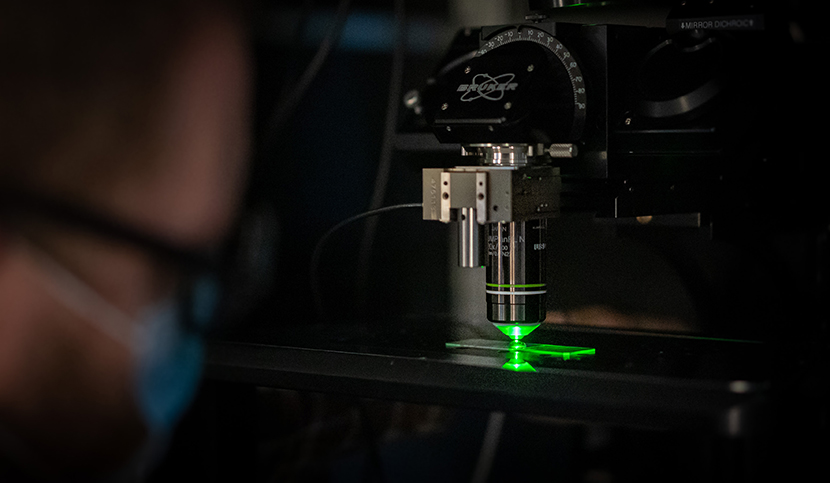The Paris Brain Institute has acquired a new state-of-the-art multi-photon microscope thanks to the support of the Edmond J. Safra Foundation. This custom-built microscope will enable several teams at the Institute to carry out highly advanced explorations on multiple scales.
For the past few weeks, the Paris Brain Institute has been equipped with a new multi-photon microscope, tailored to the needs of its researchers, thanks to the support of the Edmond J. Safra Foundation, which, along with its Chairwoman, Mrs. Lily Safra, is among the most significant donors to the Institute.
The multi-photon microscope is an instrument that allows scientists to acquire images deep inside the brain of a still developing animal, or while it is performing a behavioural task. This type of instrument is essential for establishing links between brain activity and behaviour.
Because each type of experience is unique, a multi-photon microscope must be versatile and customizable. By working with Bruker, a leading company specializing in the construction of these devices, the experts of the Paris Brain Institute have designed instruments that meet their needs.
” Two pulsed infrared lasers, two very sensitive detectors, custom-made microscope stand, and the swivel objective allow a great freedom on the type of samples visualized and experimental conditions. This microscope is particularly well suited for studies in drosophila but can also be used in behavioral studies in zebrafish and mice, conducted by several teams at the Paris Brain Institute. » Basile Gurchenkov, operational manager of the ICM.quant cell imaging platform.
|
ICM.quant Biomimaging core facility : https://quant.institutducerveau-icm.org
|
Several teams at the Paris Brain Institute have developed new research projects, using mice and fruit flies, based on special behavioral tests of very high level. The multi-photon microscope represents a major and absolutely essential piece of equipment for the Brain Institute.
“Developmental and behavioral imaging work involves long-term experiments, in which each manipulation can occupy the instrument for several hours and sometimes up to 24 hours at a time. The acquisition of this equipment, thanks to the support of the Edmond J. Safra Foundation, provides a real impetus for the advancement of research, in particular our project to understand the cerebral bases of our individuality.“Bassem Hassan, team leader and scientific director of the Paris Brain Institute
“I am very proud to make this new contribution to the Paris Brain Institute. I am confident that this cutting-edge equipment, in the hands of the Institute’s remarkable researchers, will lead to important advances in the quest for a fuller understanding of brain diseases.” Mrs. Lily Safra, Chairwoman of the Edmond J. Safra Foundation and Honorary Chairwoman of the Association of Friends of the Paris Brain Institute.
| EMERGENCE OF BEHAVIORAL INDIVIDUALITY IN THE FLY’S BRAIN: A GENERAL PRINCIPLE FOR THE NEURODEVELOPMENTAL ORIGIN OF AN ASPECT OF PERSONALITY?
https://institutducerveau-icm.org/en/actualite/emergence-of-behavioral-individuality/
|
About the Edmond J. Safra Foundation
Edmond J. Safra, one of the 20th century’s most accomplished bankers and a devoted philanthropist, established a major philanthropic foundation to ensure that individuals and organizations would continue to receive his assistance and encouragement for many years to come. Under the chairmanship of his beloved wife Lily, the Edmond J. Safra Foundation draws continuing inspiration from its founder’s life and values. It has supported hundreds of organizations in more than 40 countries around the world, largely in its three main areas of focus: education, science and medicine, and religious life. In 2005, it enabled the creation of the Paris Brain Institute by financing the construction of its research building. Even today, its generous loyalty allows researchers to continue their fight against diseases of the nervous system. www.edmondjsafra.org







